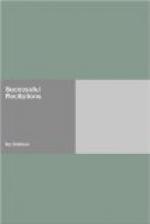“The songs they sing
of Roostrum
Fill all the past with light;
If truth be in their music,
He was a noble knight.
But were those heroes living,
And strong for battle still,
Would Mehrab Khan or Roostrum
Have climbed, like these, the Hill?”
And they replied, “Though
Mehrab Khan was brave
As chief, he chose himself what risks to run;
Prince Roostrum lied, his forfeit life to save,
Which these had never done.”
“Enough!” he
shouted fiercely;
“Doomed though they be to hell,
Bind fast the crimson trophy
Round both wrists—bind
it well.
Who knows but that great Allah
May grudge such matchless men,
With none so decked in heaven,
To the fiends’ flaming den?”
Then all those gallant robbers
Shouted a stern “Amen!”.
They raised the slaughtered sergeant,
They raised his mangled ten.
And when we found their bodies
Left bleaching in the wind,
Around both wrists in glory
That crimson thread was twined.
Then Napier’s knightly heart,
touched to the core,
Rung like an echo to that knightly deed;
He bade its memory live for evermore,
That those who run may read.
THE PRIVATE OF THE BUFFS.
BY SIR FRANCIS HASTINGS DOYLE.
["Some Sikhs and a private of the Buffs having remained behind with the grog-carts, fell into the hands of the Chinese. On the next morning they were brought before the authorities, and commanded to perform the Kotow. The Sikhs obeyed, but Moyse, the English soldier, declaring that he would not prostrate himself before any Chinaman alive, was immediately knocked upon the head, and his body thrown on a dunghill.”—Times.]
Last
night among his fellow roughs,
He
jested, quaffed, and swore;
A
drunken private of the Buffs
Who
never looked before.
To-day
beneath the foeman’s frown
He
stands in Elgin’s place
Ambassador
from Britain’s crown,
And
type of all her race.
Poor,
reckless, rude, low-born, untaught,
Bewildered,
and alone,
A
heart with English instinct fraught,
He
yet can call his own.
Ay,
tear his body limb from limb,
Bring
cord or axe or flame;
He
only knows that not through him
Shall
England come to shame.
For
Kentish hop-fields round him seem’d
Like
dreams, to come and go;
Bright
leagues of cherry blossom gleam’d
One
sheet of living snow;
The
smoke above his father’s door,
In
grey, soft eddyings hung:
Must
he then watch it rise no more
Doom’d
by himself, so young?




